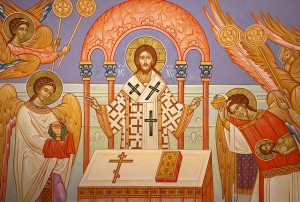Another great post over on Pastoral Meanderings by Pastor Peters:
 “Wow! That is a lot to take for someone who has had only a passing association with church before!” So said one visitor to a Sunday morning Divine Service at my parish. She did not say it but clearly her comment meant “I wish the liturgy were more accessible” to a stranger to the church like me…
“Wow! That is a lot to take for someone who has had only a passing association with church before!” So said one visitor to a Sunday morning Divine Service at my parish. She did not say it but clearly her comment meant “I wish the liturgy were more accessible” to a stranger to the church like me…
It would not be the first time someone has uttered those sentiments. It IS a great deal to take in for those who have not had much association with the church before. I will not deny it one bit. Neither will I suggest that it is a fruitful pursuit to try and find a way to dumb down the liturgy just in case there may be (and there always are) people who are strangers to the church and to the mass). I am sure it is overwhelming and even shocking. I would be disappointed if it were not — for what would it say of us if the Divine Mystery of Christ (both efficacious Word and Sacrament) were easy enough to get and dismiss out of hand!
I tell such folks not to make a judgment quickly but to return to the liturgy over and over again. Only then, with familiarity, can come the deep appreciation for the mystery and its grace bestowed upon us by Christ through His Word and Spirit. The liturgy is one of those things learned by doing as much as by studying.
If you are an avid reader of this blog, you know that I do not quote Aristotle — not ever — but one of his tidbits of wisdom certainly applies to the Divine Service:
For the things we have to learn before we can do them, we learn by doing them.
— Aristotle, The Nicomachean Ethics
Though some find it offensive that any person off the street, a stranger to God and His worship, cannot enter the church and feel perfectly at home, I find just the opposite offensive. If a stranger to God and His worship feels at home in the liturgy, there must be something wrong with the liturgy. The liturgy or mass is off putting — not because it is designed to offend but because it goes against all that the sinful heart values most — easy, comfortable, feeling oriented, self-centered pleasure. What is most disarming about the liturgy or the Divine Service is that it compels us to shed ourselves and to become focused upon and open to the work of the Lord through His means of grace. Such is the domain of the Spirit and not simply the training of the human heart but, that said, it is discipline whose value is learned by experience.
We tell parents all the time that the repetition of the liturgy is helpful to the child learning by the experience of it who God is, what He has done, and how He communicates to us the fullness of His grace and gifts. Would not the same be also true of adults who come as infants into the presence of God in the holy ground of the liturgy?
Hardly any sport is transparent or obvious upon first view. Watching the game being played is one of the most important ways we learn its rules and an appreciation for the sport. In the hospital we have interns and residents who continue their education by watching and doing — believing that this is the most effective way to train our doctors. Why do some insist that we must make worship cogent for and accessible to the unchurched who know little of God or His ways? Why do some visit once and presume that they have seen and learned enough to make a reasonable judgment against the church?
To the stranger come upon us, I say stay here long enough to get to know the liturgy. Study it and learn the faith from it, to be sure, but resist the great temptation to judge what you see or experience until you learn its words, its rhythm, and its tempo. To the parent worrying about a child growing distracted from or bored with the liturgy, I say hang in there. Children learn by doing and they are absorbing from the liturgy more than is obvious to you. Reinforce what happens in the Divine Service, to be sure, but do not reject what happens as they experience the church’s liturgy and song over many years of growing up.